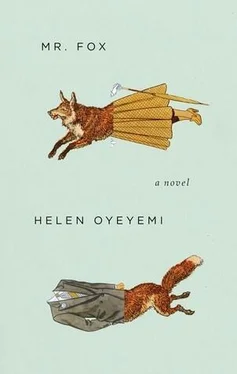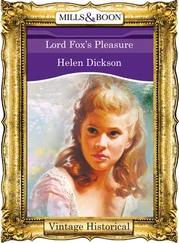“How can I be a better husband?” he asked her humbly.
Helene gave Charles Wolfe a mask to wear. A white mask. Not flat white; rather, a colour suggestive of earth, brilliant but faintly fibrous, as it is beneath the skin of a pear. The mask’s expression was neither happy nor sad. Its lips ran in a straight geometric line, a humanly impossible one. It was a heavy mask; it changed the way Charles held his head, and, by extension, it changed the way he moved. As long as Charles wore the mask, Helene allowed him to escort her to dinners out, friends’ weddings, etc. Helene’s friends tried to behave as if her masked husband didn’t bother them, but he bothered them tremendously. I suppose it’s difficult to find a face friendly if you see it every day and it never smiles at you.
Charlie Wulf. . Charlie Wulf was sold to a plainlooking woman. Plain but wholesome and good-hearted. Laurel. She turned her back on the frivolous pursuits of her class and trained as a nursery school teacher. She wore long skirts and always found a kind word and a hug for even the most tiresome of the children who played at her feet. Charlie had absorbed more training than anyone had credited him with, and he had no trouble speaking Words of Love to his wife. Laurel didn’t like to hear them. It was all too insincere. She worried about how they looked as a couple — on the street, in their home. She turned all the household mirrors to the wall. She heard people making fun of her, even though Charlie assured her that she was imagining things. She became jealous if he appeared to take too much of an interest in conversation with her female friends. Laurel wrote Charlie tearstained letters, turned him out of the house again and again, arrived unannounced at his hotel room in the early hours of the morning, just to check that he was alone. She couldn’t believe in him.
At his wits’ end, he asked her what he could do to help her believe.
And Laurel gave Charlie a mask to wear. .
Reynardine might have come to the rescue. (That would have been unfortunate for Mrs. Wolfe and Mrs. Wulf.) But favours aren’t always returned. Charles and Charlie don’t seem to have communicated at all after graduating. Not a word, not even an attempt at a word. They no longer had need of each other.
Or—
I realise I’m reading very finely between the lines here, but maybe those two had fallen in love, and wanted to spare each other the anxiety of speaking with subtext, each wondering what the other wanted. A boy of weak character and his strong-minded friend: Neither would have been likely to declare themselves first. It’s not impossible, is it, that what I’m saying could be true? It’s the abruptness more than anything. In the first place they seem to have chosen each other to confide in, out of all the boys in the Academy, when actually it would have been safer to do as most of us do and confide only in our diaries. For many months these two found something to say to each other every day. Then they married, and nothing. There are feelings of some kind in this matter, even if I don’t know what they are. The lake deeper than either of them had supposed, Charles kicking for shore with Charlie in his arms, the seconds without light or breath before both heads rose up and claimed them. .
I’m surprising myself. I’m not a romantic.
At any rate, I’ve derived some interest from finding out about my father’s time at the school. Before this I had been looking for answers. I’d wondered about the cloud that seems to hang over my name when it’s called in the register, and I’d wondered why the murder rate is so high nowadays, and I’d wondered about the mask, and about the difficulty my father had in looking at me and speaking to me. My mother didn’t speak to me, either — she was always busy; she sat on committees and things. Only after years of schooling do I talk as others do. Even now Mrs. Engels sometimes looks more thoughtful than usual when I volunteer an answer in class. And I wondered, of course, why I was sent here when I hadn’t done anything wrong. It must have just been Decisive Thinking.
Mr. and Mrs. Fox were hosting a dinner party. Downstairs, a motherly-looking woman with fat grey pin curls laid the table and checked on the various items being cooked in the kitchen. Upstairs, the Foxes were engaged in a dispute. Mrs. Fox had left her dressing-room blinds up, and Mary Foxe stood on a block of air and observed the scene with interest. Mrs. Fox had a lot of nice things, and she was careless with them — perfume bottles with plush atomisers peeped out of embroidered pillowcases. Silk stockings tangled themselves around ivory combs shaped like castles. A gleaming sable fur rippled in the light. Mrs. Fox seemed to be using it to protect the carpet from her pots of face cream. The lady herself sat at her dressing table, her hair swept up into a chignon, her eyes downturned. She spoke, then her husband spoke, then she spoke again, with stubborn emphasis, and all the while she toyed with a brooch, a pink-and-white gold fox, complete with filigreed brush tail. Its eyes were two garnets.
Mrs. Fox pinned the brooch to the collar of her dress, stood, and made for the door, which Mr. Fox promptly closed and leant against with his hands in his pockets.
Mrs. Fox said something sarcastic. Her husband looked into her eyes and said nothing. Mrs. Fox laughed nervously until the gaze ended. Then Mr. Fox saw Mary. He grimaced slightly, and winked. Mary grimaced and winked back.
“What do you care whether I wear it or not? No one will notice.”
“You know what our friends are, D. Everyone will notice. So shut up and put it on.”
“What did you say to me, St. John Fox?”
“Shut up and put it on.”
“You can’t tell me to—”
“Shut up and put it on. Or I’ll phone round and cancel.”
“Appearances,” Mrs. Fox said. “Got to keep up those appearances, haven’t we?”
“What do you want, a slap?” He made his offer in a tone of flat pragmatism, like an expert barterer at market; it was as if he was saying, Let’s face it, you’ll be lucky to get a slap.
“Ha, ha!” Mrs. Fox’s voice rang out scornfully. “Go ahead!”
He took a step towards her and she ducked behind a standing mirror. He moved it aside and scooped her up in his arms. Within moments Mr. Fox was pacing around the room with his lady wife over his shoulder, kicking ineffectually.
“I can’t wear it,” Mrs. Fox said breathlessly. “I told you.”
“Yes, you said it gives you a rash.” Mr. Fox exchanged disbelieving glances with Mary.
“It’s true.”
“Why now? You’ve had it awhile.”
“I don’t know. Maybe because you don’t love me.”
“That’s a ridiculous thing to say,” Mr. Fox said, in a voice that was both hearty and hollow.
“What’s ridiculous is you bullying me like this. Put me down, please. I’ll wear the stupid ring — I’ll wear it, I said, even if it makes my finger swell up to the size of my head. Then you’ll be sorry.”
Having been set on her feet again, Mrs. Fox caught sight of her disarranged hair and wailed. Mr. Fox went downstairs and, as he spent a few minutes charmingly obstructing the caterer’s efforts to finalise preparations, Mary watched Mrs. Fox pick up her wedding ring and slip it onto her finger. Mary watched Mrs. Fox rub at her ring finger as she redid her chignon, pushing the gold band first above and then below her knuckle, until at last she yanked it off and crossed over to the sink in the next room, where she plunged her hand under a running tap, so relieved by the cold in the water that she fell to her knees and splashed her face and her dress. Mary would have liked to speak to the woman, to try and offer her some kind of assurance that she would be happy at a later date. The urge to do so became overwhelming, so she left. Mr. Fox was out in the garden, smoking his pipe. He murmured a pleasantry, which Mary ignored.
Читать дальше












